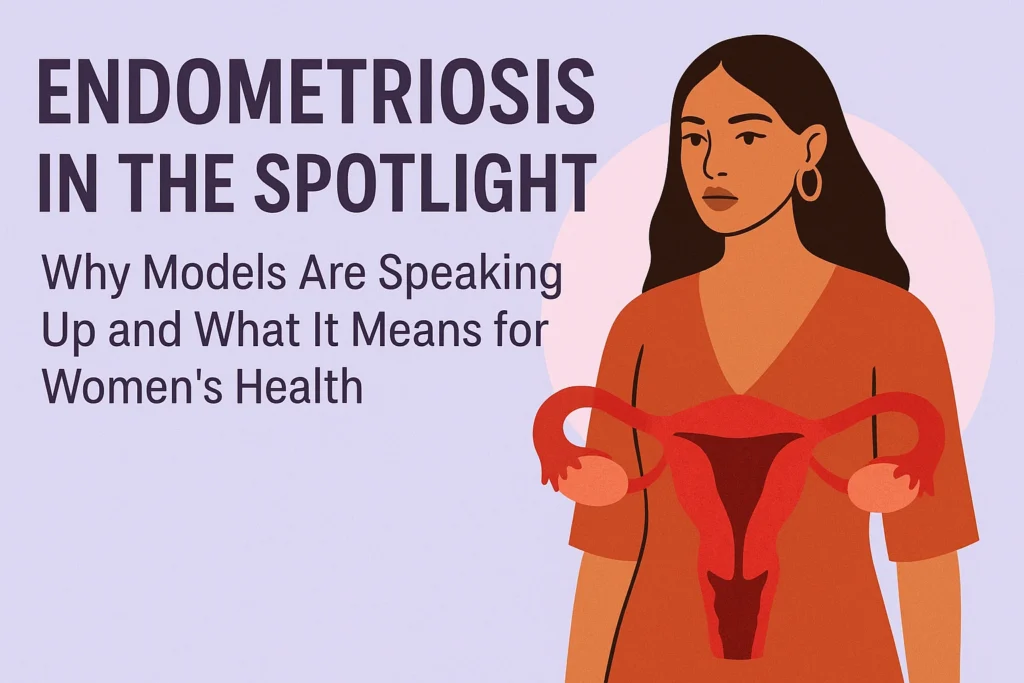
For years, endometriosis has been a silent struggle affecting millions of women worldwide. Once dismissed as “just painful periods,” it is now gaining visibility thanks to renowned models, celebrities, and influencers who are bravely speaking about their experiences. Their openness is not only breaking long-standing taboos around menstrual health but also sparking global conversations about women’s health, reproductive rights, and the urgent need for better medical support.
Celebrity Voices Shaping the Endometriosis Narrative
In recent years, high-profile women have stepped forward to share their battles with endometriosis. Supermodel Bella Hadid has spoken about her ongoing health struggles, and other celebrities like Halsey and Chrissy Teigen have also opened up about their journeys. Their honesty has shed light on a condition that often remains underdiagnosed, misunderstood, and overlooked by both society and healthcare systems.
By amplifying these voices, awareness spreads beyond medical journals and into mainstream media, encouraging women who silently suffer from chronic pelvic pain, infertility, fatigue, and inflammation to seek help. More importantly, it validates their pain in a world where women’s health concerns are too often minimized.
Understanding Endometriosis: Beyond the Headlines
Endometriosis is a chronic disorder where tissue similar to the lining of the uterus grows outside the womb. This misplaced tissue leads to painful symptoms, heavy menstrual bleeding, digestive issues, and in many cases, fertility problems. According to global health estimates, nearly 1 in 10 women of reproductive age are affected—yet many wait up to seven to ten years before receiving a proper diagnosis.
The lack of research funding, limited treatment options, and inconsistent medical education contribute to this delay. Most women are initially told their pain is “normal” or misdiagnosed with other conditions like irritable bowel syndrome or ovarian cysts. This diagnostic gap highlights the need for greater investment in gynecological research and the importance of listening to patients’ lived experiences.
Women’s Health Trends: From Stigma to Advocacy
What’s changing today is the cultural shift driven by advocacy and celebrity openness. Social media platforms have become powerful spaces where women share their endometriosis stories, exchange management tips, and raise awareness about reproductive health. Online campaigns during Endometriosis Awareness Month have transformed a once-private pain into a public movement, breaking stigma and creating solidarity.
Healthcare providers are also beginning to recognize the urgency. New approaches in minimally invasive surgery, hormonal therapies, and fertility preservation options are shaping treatment pathways. Meanwhile, wellness strategies such as anti-inflammatory diets, yoga, and holistic pain management are gaining popularity as complementary solutions.
The Future Outlook: A New Era for Women’s Health
The visibility of endometriosis in the spotlight is just the beginning. With more models, celebrities, and patients demanding recognition, the conversation is shifting from awareness to action. Governments and health organizations are being urged to fund research, create specialized clinics, and improve access to care.
Looking ahead, we may see artificial intelligence tools assisting in early detection, genetic studies exploring predispositions, and new pharmaceuticals designed specifically for endometriosis-related pain and inflammation. Most importantly, as public figures continue to break the silence, younger generations of women may grow up in a world where their symptoms are taken seriously from the start.
A Personal Reflection on Awareness
As awareness grows, what strikes me most is how personal stories change the landscape of medicine. When models and celebrities openly discuss their pain, they empower everyday women to seek answers, advocate for themselves, and refuse to be dismissed. Endometriosis is no longer an invisible condition—it is a global women’s health issue that demands recognition, compassion, and innovation.